Top 7 Signs Your Furnace Needs Repair in Belleville, MI
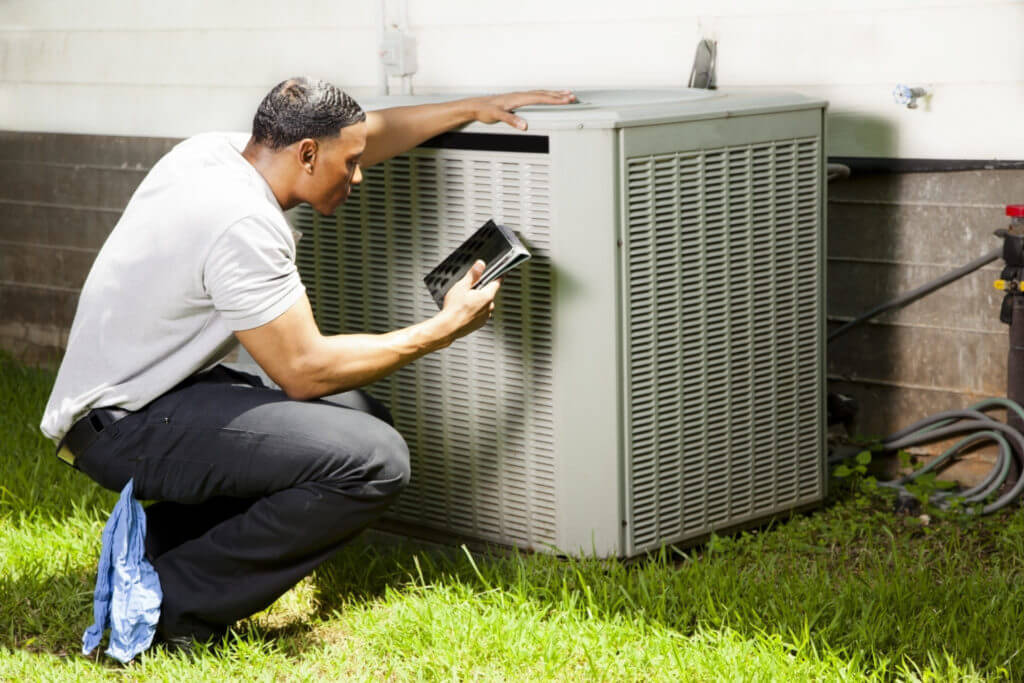
Top Signs Your Furnace Needs Repair in Belleville Before Winter Hits As winter rolls into Belleville, MI, the last thing you want is a furnace that quits when you need it most. At ATC Heating & Cooling, we’ve helped local homeowners keep warm for decades. Here are the top warning signs your furnace needs repair before the cold really sets in. 1. Unusual Noises Banging, rattling, or squealing are never good. These sounds often signal worn parts, loose belts, or mechanical issues. 2. Weak or Uneven Heating If some rooms are freezing while others are warm, your furnace may be struggling with airflow or ductwork problems. 3. Rising Energy Bills An unexplained spike in heating costs usually means your system is working overtime. 4. Frequent Cycling If your furnace constantly turns on and off, it could be an issue with the thermostat, sensors, or clogged filters. 5. Strange Smells Persistent burning odors or musty smells may point to dirty filters, electrical issues, or mold growth inside ducts. 6. Yellow Pilot Light A furnace flame should burn blue. Yellow or flickering flames can indicate dangerous carbon monoxide leaks. Why Choose ATC Heating & Cooling in Belleville? Local, trusted HVAC pros 24/7 emergency repair Licensed and insured technicians Serving Belleville, Van Buren Township, Canton, Ypsilanti & Washtenaw County Top Furnace Brands in Southeast Michigan Homeowners in Belleville, Van Buren, Canton, and across Washtenaw County often ask which furnace brands we service. The good news: ATC Heating & Cooling works on all major brands. Here are 20 of the most common in SE Michigan: Trane Carrier Lennox Rheem Goodman American Standard Bryant York Amana Heil Comfortmaker Armstrong Air Coleman Daikin Ruud Payne Luxaire Mitsubishi Electric (ductless systems) Tempstar Bosch Frequently Asked Questions (FAQ) Q: How often should I service my furnace? A: Once a year, ideally before winter. Q: What’s the average cost of furnace repair in Belleville? A: It ranges from $150–$600 depending on the issue. Q: How long does a typical furnace last? A: Most furnaces last 15–20 years with proper maintenance. Q: Can ATC handle emergency calls? A: Yes, we provide 24/7 emergency furnace repair in Belleville and surrounding areas. Customer Reviews ⭐️⭐️⭐️⭐️⭐️“ATC Heating & Cooling saved us when our furnace broke down in the middle of January. Fast, friendly, and affordable!” – Mark J., Belleville, MI ⭐️⭐️⭐️⭐️⭐️“Professional and quick service. They explained the issue and had my furnace running again in no time.” – Sarah T., Van Buren Twp. ⭐️⭐️⭐️⭐️⭐️“We’ve trusted ATC for years. Honest advice, fair pricing, and reliable repairs every time.” – Brian L., Canton, MI Helpful Resources Internal Resources Furnace Repair Services AC Repair in Belleville Replacing Your HVAC Emergency Heating Service External Resources ENERGY STAR – Furnace Efficiency EPA – Indoor Air Quality DTE Energy Rebates Request a FREE ESTIMATE * Indicates required questions
Van Buren Charter Township HVAC Maintenance Checklist for Every Season
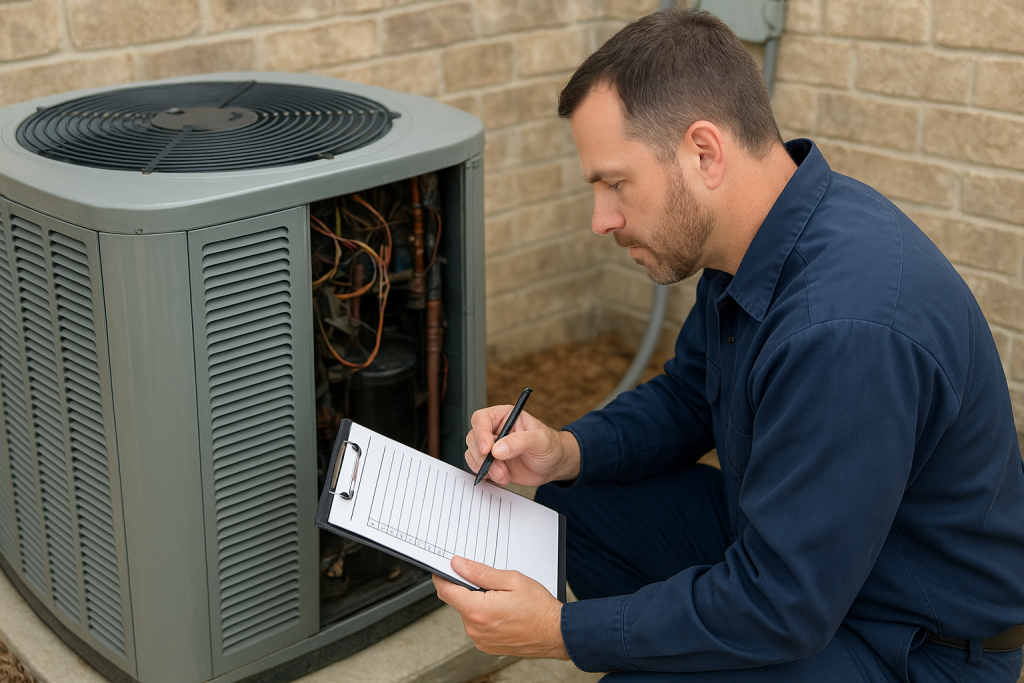
Van Buren Charter Township HVAC Maintenance Checklist for Every Season From freezing winters to humid summers, Van Buren Charter Township weather keeps HVAC systems busy. Use this local, seasonal checklist to protect comfort, improve efficiency, and prevent breakdowns. For professional help, call (734) 697-8288. Author: Atch Heating and Cooling Seasonal HVAC Maintenance: What to Do and When Spring & Summer Replace air filters every 1–3 months. Clean outdoor condenser and indoor evaporator coils. Clear debris within 2–3 feet of the outdoor unit. Flush condensate drain line and check the pan. Test thermostat, safety controls, and breakers. Verify airflow at registers; vacuum return grilles. AC installation » Fall & Winter Replace filters at the start of heating season. Inspect burners, igniter, and heat exchanger for issues. Check gas pressure, flue venting, and CO levels. Clean furnace blower and fan assembly; lubricate where applicable. Tighten electrical connections; inspect belts and pulleys. Confirm safe shutoff and limit switch operation. Furnace maintenance » Services Offered Heating and air conditioning installation Seasonal maintenance and tune-ups Emergency HVAC repairs Indoor air quality and filtration Energy-efficient system upgrades See all HVAC services » Top HVAC Brands We Service Carrier Trane Lennox Rheem Bryant Goodman York Amana American Standard Heil About Van Buren Charter Township Van Buren Charter Township sits in western Wayne County, Michigan. Organized in 1835 and named after President Martin Van Buren, the township is home to more than 45,000 residents and is known for Belleville Lake recreation and proximity to Detroit Metropolitan Airport. A mix of neighborhoods, lakeside properties, and growing business districts makes reliable, efficient HVAC a year-round necessity for local homes and small businesses. Quick Reference: DIY vs. Professional Tasks DIY-Friendly Leave to a Professional Filter changes; clearing debris; vacuuming returns; basic coil cleaning Refrigerant diagnostics; gas pressure and combustion checks; CO testing; heat exchanger inspection FAQ How often should filters be replaced? Every 1–3 months, more frequently with pets or allergies. Is maintenance really necessary twice a year? Yes. A cooling tune-up before summer and a heating tune-up before winter reduce breakdowns and lower energy costs. What are signs I need a professional inspection? Unusual noises, rising utility bills, short cycling, hot and cold spots, water near the indoor unit, or tripped breakers. Reviews “Fast, professional, and honest. System ran flawlessly all summer.” — Local Homeowner “We trust Atch for seasonal furnace checkups. On time and affordable.” — Belleville Resident Helpful Resources ENERGY STAR: HVAC Guide EPA: Indoor Air Quality AHRI Directory of Certified Products Request Service » or call (734) 697-8288 Request a FREE ESTIMATE * Indicates required questions
Heating Repair vs. Replacement
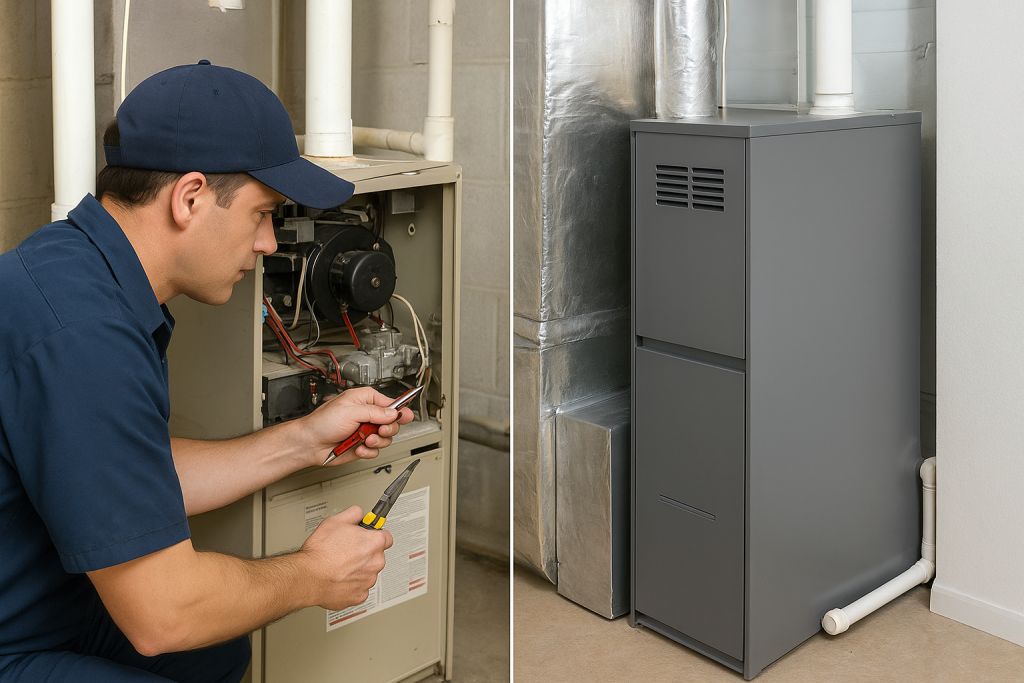
Heating Repair vs. Replacement in Van Buren Charter Township: What’s Best Serving Van Buren Charter Township and nearby Wayne & Washtenaw communities. Need fast help now? (734) 697-8288. Quick Answer If your furnace is 15+ years old, needs frequent repairs, or the repair cost is over 50% of a new unit, replacement is usually the smarter long‑term move. Otherwise, a targeted repair can extend the life of a well‑maintained system. How We Decide: Repair vs. Replace Age: Most furnaces last 15–20 years with maintenance. Older systems often deliver lower efficiency and higher repair risk. Repair cost ratio: If a single repair approaches half the price of a new, efficient furnace, consider replacement. Efficiency & bills: High utility bills, short cycling, or uneven rooms often signal declining performance. Comfort & safety: Carbon‑monoxide concerns, cracked heat exchangers, or burner issues are red‑flags for replacement. Home changes: Renovations or additions may require an updated load calculation and a right‑sized system. Prefer a pro to check it out? Book a tech for Heating Repair in Van Buren Township. Our Services Our Products When a Repair Makes Sense System is under ~10 years old and otherwise reliable Issue is minor (ignitor, sensor, capacitor, thermostat, drain) Annual maintenance has been consistent No safety alerts or CO concerns When a Replacement Is Smarter Major component failure (heat exchanger, control board) on an older unit Repeated breakdowns each season Poor comfort: cold spots, short cycling, noisy operation High energy bills compared to similar homes Exploring options? See our Heating Services and ask about a free in‑home assessment. Energy Efficiency Tips for Van Buren Homes Right‑size the equipment: Request a Manual J load calculation before any replacement. Go high‑efficiency when appropriate: Modern high‑AFUE furnaces cut fuel use and improve comfort. Seal and filter: Replace filters on schedule and seal obvious duct leaks in attics/basements. Helpful resources: ENERGY STAR: When to Replace • DOE: Furnaces & Boilers • ACCA: Manual J Basics Top 10 Heating Brands We Service or Install Comfortmaker Trane Carrier Lennox American Standard Bryant Goodman Rheem Ruud York Ask which models fit your home and budget. Financing options are available. FAQs How long does a furnace usually last? With maintenance, many furnaces run 15–20 years. Usage, installation quality, and filter changes all matter. Is the 50% repair‑to‑replace rule legit? It’s a practical benchmark. If one repair costs over half of a new install, replacement typically delivers better value. Will a high‑efficiency furnace lower my bills? Often yes. Higher AFUE models waste less fuel and can reduce monthly costs while improving comfort. Do I need a bigger system for an addition? Maybe. Additions change your home’s heating load. Request a Manual J calculation to size correctly. Can I finance a replacement? Yes. See our Financing page for current options. Recent Customer Feedback Jonathan S. “Responsive, fair pricing, and excellent furnace install.” Andrew S. “Fast, professional service. I use ATC for all HVAC needs.” Claudette A. “Thorough diagnostics and friendly techs. Highly recommend.” See more on our Google Reviews. About ( Air Temperature Control, Inc. ) Air Temperature Control Comfort Masters is a local, family‑operated team serving Belleville, Van Buren Charter Township, Romulus, Ypsilanti, Canton, and nearby communities. We offer flat‑rate repairs, 10‑year warranties on many systems, and 24/7 emergency service. Our technicians service all major brands and provide honest options so you can decide whether repair or replacement fits your goals and budget. Ready for expert help? Contact ATC or call (734) 697-8288. Request a FREE ESTIMATE * Indicates required questions
Can A New AC Lower Energy Costs
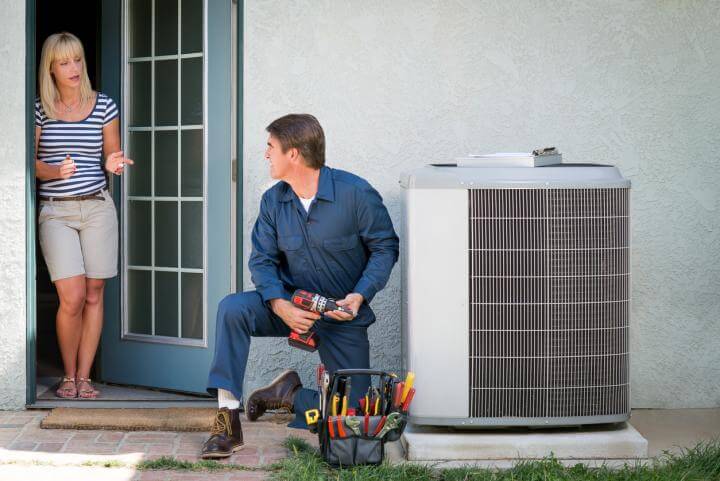
New AC Units Are More Efficient and Can Save You Money How Much Can a New AC Save on My Power Bill?A new air conditioner can work better and lower your cooling bills by up to 20%. How does this work? Most old air conditioners use a lot more energy than the new ones we have today. This means your old AC needs more electricity to keep your house cool, and you see this in your higher power bills every month. If you wonder if a new air conditioner could lower your energy bills, the answer is probably “yes.” New AC Units Save Energy and Money Air conditioners today are much better and brighter than the old ones. They are built to cool your home while using less electricity. ENERGY STAR, says that if you switch to a high-efficiency air conditioner, you could pay up to 20% less to cool your home, especially if your current AC is more than 10 years old and the new one is set up correctly. Depending on your house and how much you use it, you could save hundreds of dollars annually, instilling a sense of optimism about the potential for significant savings! Our Services Our Products Why Are New Air Conditioners Better at Saving Energy? A big reason is something called the SEER rating, which stands for Seasonal Energy Efficiency Ratio. This number tells you how good an air conditioner is at turning electricity into cool air. The bigger the SEER number, the better the AC is at saving energy. Starting in 2023, the lowest SEER2 rating for new air conditioners is: 13.4 SEER2 in northern states 14.3 SEER2 in the Southeast and Southwest for smaller units 13.8 SEER2 for bigger units in the Southeast and Southwest Some of the newest air conditioners are even better, with SEER2 ratings as high as 18 or more! If your old AC was put in before 2010, it might have a SEER rating of only 8 or 10. That means it uses a lot more energy to cool your house. Even the least efficient air conditioners you can buy today are much better than the old ones. Are There Rebates for Getting a New AC? Yes! You might worry about the higher price if you want to upgrade to a new, energy-saving air conditioner. But you can often get some money back, called rebates, or save on taxes when you buy a better AC. Rebates and tax credits can come from: The federal government (like laws from the Inflation Reduction Act of 2022) Your state or local utility company Air conditioner brands or makers With the Inflation Reduction Act, you can get a federal tax credit if you buy a high-efficiency AC with the ENERGY STAR label. Sometimes you can even get extra discounts from your power company. To qualify for these savings, you usually need to: Get a central air conditioner with a high SEER2 and EER2 rating (ask your installer about the exact numbers) Pick a unit that is ENERGY STAR-certified Have a licensed HVAC pro install your AC Always ask the person putting in your AC if there are rebates you can get. Many installers are well-informed about these and can help you apply. This means that you’re not alone in this process and there are resources available to help you save money on your new AC. Signs It’s Time for a New Air Conditioner It may be time to get a new AC. Here are some clues: Your Energy Bills Keep Going Up If your summer bills are higher every year, your air conditioner may be using more and more energy. Your AC Is Over 10-15 Years Old Most air conditioners last around 12–15 years. If yours is older, it might be time for a new one. You Need Repairs Over and Over If you had to fix your AC more than once this year or the repair is expensive, buying a new one might be smarter. Here’s a tip: If the repair cost times the age of your AC is more than $5,000, it’s better to replace it because at that point, you’re likely to spend more on repairs than the cost of a new unit. Your House Isn’t Cooling Evenly or Feels Humid Old air conditioners can have trouble keeping the whole House cool or removing humidity. Your AC Uses R-22 Refrigerant If your air conditioner uses R-22 (also called Freon), it’s outdated. It costs a lot to fix because this refrigerant is no longer made in the U.S. Getting a new AC can help you save money, keep your house comfortable, and even help you get some money back! Request a FREE ESTIMATE * Indicates required questions
What Is a Packaged HVAC System
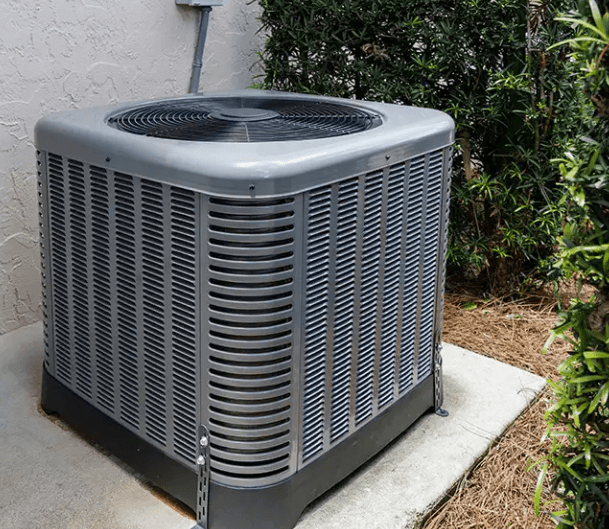
Belleville and Romulus’s Heating and AC Repair Pros What is an HVAC Packaged Unit | Residential Indoor Comfort A packaged HVAC system is a type of heating and cooling unit where all the important parts are together in one big box outside your home or building. This box has all the important parts inside it. The unit is usually placed on the roof or on the ground outside your building. This helps save space inside because you don’t need a big furnace or air handler inside your home. Get the Best HVAC Service Near You in Ypsilanti, MI A packaged heat pump system combines heating, air conditioning and air-handling all in one unit. At Air Temperature Control Systems, Inc These systems offer an energy efficient solution for homes in Bellevue, Ypsilanti Charter Township, or Washtenaw County areas Unlike a regular heating and cooling system that typically has two separate units, a packaged HVAC system consolidates all the essential components into a single, space-saving unit. When you want to heat or cool your house or business, there are many systems to choose from. A packaged unit is an “all-in-one system” that can provide both cooling and heating from a single cabinet. Types of Packaged HVAC Systems Different Types: of Packaged HVAC Systems, in SE Michigan each designed to cater to different needs. Understanding these types empowers you to make an informed decision about the best system for your specific requirements. Packaged systems can be just air conditioners, heat pumps, or a mix of a heat pump and a gas furnace (called dual-fuel units). Packaged Air Conditioners: These work like big air conditioners and put all the cooling parts in one unit. Sometimes, they can also heat using an electric coil, or they can connect to a separate heater if you need it during cold weather. Packaged Heat Pumps: These units can heat and cool your space by moving heat in or out. They are energy-saving and work best in places with moderate weather. Packaged Gas-Electric Systems: This system has a gas furnace and an electric air conditioner in the same unit. It cools your space in the summer using electricity and warms your space in the winter using gas. This is a good choice if you live somewhere with hot summers and cold winters. Single Unit: Packaged HVAC systems are different from split systems because everything is together in one big box outside. Split systems have one part inside and one part outside, but packaged systems keep it all in one place. Saves Space: Since you only need one outdoor unit, these systems are great for homes or buildings that don’t have much space inside. Made in a Factory: These units are put together in a factory, which usually means they are made well and might cost less to install. Heats and Cools: Most packaged systems can heat and cool your home, so you don’t need to buy a separate heater. Easy to Install: Because the whole unit goes outside, it is usually easier and faster to set up than other systems. Our Services Our Products Comfort Shouldn’t Cost a Fortune! Get fast, affordable service with a FLAT FEE GUARANTEE* Is a Packaged HVAC System Right for You? Weighing the Pros and Cons When it comes to HVAC systems, there’s a lot to consider. Packaged hvac systems, like any other option, come with their own set of advantages and disadvantages. Pros: ✅ Saves Space: With everything neatly packed in one big box outside, you can bid farewell to the need for a lot of room inside your house or business, bringing a sense of relief from potential clutter. ✅ Easier to Install: The simplicity and speed of the setup, thanks to the fewer parts compared to other systems, will reassure you about the ease of the installation process. ✅ Costs Less at First: The potential cost-effectiveness of a packaged system, which can sometimes be cheaper to buy and install than separate indoor and outdoor units, will make you feel financially savvy about your investment. ✅ Easy to Maintain: Since all the parts are together, HVAC workers can find and fix problems more easily. ✅ Can Go Almost Anywhere: A packaged unit can be placed on the ground or on the roof, so it fits in many places. Cons: ❌ Weather Exposure: Since these systems are kept outside, they get rained on or snowed on, and they can get dirty or worn out more quickly. ❌ Not Always the Most Efficient: While packaged units work well, some split systems, especially the best models, use even less energy and work better. Who Should Get a Packaged HVAC System? Packaged HVAC systems are not for everyone, but they can be really helpful for some people. Here’s who should think about getting one: 🏠 Homes with Small Indoor Spaces: A packaged system can be a great option if you don’t have room inside for a big furnace or air handler. 🏢 Businesses and Stores: Many companies use these on the roof to save space and make fixing them easier. 🌡️ Places with Mild Weather: Packaged units work best in areas where winters aren’t super cold, but you still want heating and cooling. 🔧 People Who Want Easy Maintenance: If you want a simple system to check and repair, a packaged HVAC system makes it easier for workers to do their jobs. Trust the local team with over 100 years of combined experience providing expert furnace, air conditioning, and indoor air quality services. We fix air conditioners and furnaces for a price you can count on, so there are no surprises. We will also replace old systems and install brand new ones. Air Temperature Control Systems, Inc We are an authorized Comfortmaker dealer, which means we offer some of the best prices on high-efficiency equipment. These new systems use less energy, which can save you money on your bills. Plus, when we put in a new system, you get a 10-year parts warranty. That means you won’t have
Belleville and Romulus’s Heating and AC Repair Pros
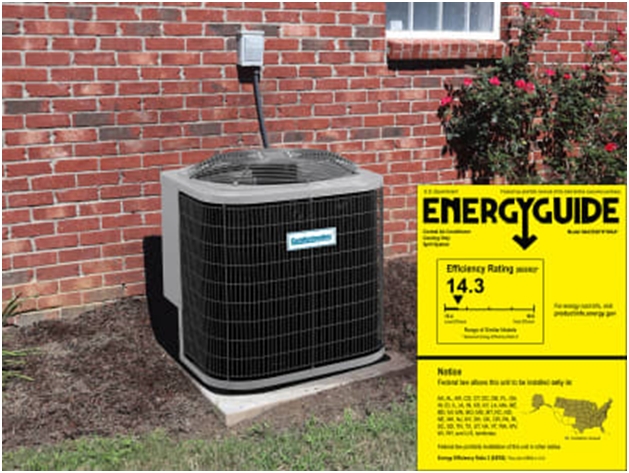
Belleville and Romulus’s Heating and AC Repair Pros We Offer Service 7 Days A Week, 365 Days A Year. Certified TechniciansService Guarantee. Wayne County Licensed HVAC Technicians. Air Temperature Control Heating and Cooling, LLC is a family-owned company dedicated to delivering professional HVAC services to our neighbors throughout the greater Wayne County area. Contact us today to learn more about our Furnace and Boiler services in 48111 (Belleville); 48174 (Romulus); 48184 (Wayne) If You Need Quick & Efficient Heating Repair. Do you experience high energy costs, yet your home never feels like it’s at the right temperature? Or, maybe you’ve experienced an unexpected system breakdown? We offer air conditioner and furnace repairs at an affordable flat rate and perform complete system replacements and new installations. As an authorized Comfortmaker Dealer, we offer competitive prices on the leading high-efficiency equipment guaranteed to reduce your energy costs. Plus, new system installations come with a 10-year parts warranty – so you can rest assured your comfort is secure. Our Services Our Products Comfort Shouldn’t Cost a Fortune! Get fast, affordable service with a FLAT FEE GUARANTEE* We serve the greater Belleville, MI area with 24/7 furnace & A/C repair, installation, maintenance, parts, & air duct cleaning. Our technicians are drug-free, prescreened, and receive regular training to address any heating, cooling, or electrical challenges. They are skilled in working with all makes and models of HVAC equipment, including residential, commercial, and industrial systems. We offer 24/7 emergency services for those urgent situations that cannot wait. Our commitment is to diagnose and address all your home comfort needs. Contact us today for a quote on AC services, repairs, or replacements. Air Temp Still Makes House Calls In addition to being certified HVAC-R professionals, we provide energy audits, generator and electrical services, building performance consultations, equipment efficiency analysis, Aeroseal, and indoor air quality solutions. We also offer cost-effective HVAC maintenance programs designed to enhance the efficiency, longevity, and affordability of your equipment. Reach out to us today to learn more about our furnace and boiler services. Contact us today to learn more about our Furnace and Boiler services. 48111 (Belleville); 48174 (Romulus); 48184 (Wayne) The New Normal In these challenging times, it’s natural to be concerned about your family’s health and safety. We understand, and we’re here to assist you. We adhere to all CDC and local authority guidelines to ensure a safe and satisfying experience for you. Your well-being is our top priority. Additionally, we use products proven to eliminate viruses. To learn more, please visit our indoor air quality page. Air Quality Testing Are you aware that the indoor air in your home could be affecting your family’s health? Stay informed with an Air Quality Test from Air Temperature Control. Our specialized tools and testing equipment measure the air cleanliness your family breathes. — Check out this video on the EPA’s 5 Indoor Air Quality Categories of Concern. Check out this video on the EPA’s 5 Indoor Air Quality Categories of Concern. Our comprehensive Air Quality Test includes a detailed report that outlines the current state of your indoor air and offers recommendations to address any issues. Your House is Your Home… It Should Be Comfortable. Join the electrification movement! Inquire about electrifying your home or business today. Electrification offers numerous benefits, including tax incentives, utility company rebates, reduced utility bills, enhanced occupant safety, and environmental friendliness. We even provide low-interest loans to help you get your project started. Contact us today! Customized Comfort Many people endure living in uncomfortable homes that drain their finances without realizing these spaces may also be affecting their health. Our approach involves assessing the entire home to uncover underlying issues and offering permanent solutions. If your bedrooms are excessively hot or your basement is too cold, simply upgrading to a high-efficiency unit won’t solve the problem. With the right expertise, care, and effort, we can transform your home into a sanctuary you’ll love. Go Green and Get Green! Take advantage of numerous incentives available for implementing energy-efficient repairs in your home or business. Explore our online savings tool to discover financial incentives that can help fund your next energy efficiency project. Tax Credits and Rebates There’s no better time than now to save money! Energy efficiency projects come with utility and federal rebates, as well as tax incentives, to minimize your out-of-pocket expenses. Energy Skilled Rest easy with our certified technicians, who have undergone the Department of Energy – Energy Skilled training program for building science-related disciplines. This prestigious training ensures you receive the highest quality in energy efficiency. The New Normal Air Temperature Control. In these challenging times, it’s natural to dwell on your family’s health and safety. We understand, and we’re here to help. We strictly adhere to CDC and local authority guidelines to ensure a safe and satisfying experience with us. Your safety is our utmost priority. Furthermore, we use products that are proven effective in eradicating viruses. To learn more, visit our indoor air quality page. Air Quality Testing Did you know that the indoor air in your home could be impacting your family’s health? Stay informed with an Air Quality Test from Air Temperature Control. Our specialized tools and testing equipment measure the air cleanliness your family breathes. Our Air Quality Test comes complete with a detailed report showing what’s present in your home or business, along with recommendations to address indoor air quality concerns. Check out this video on the EPA’s 5 Indoor Air Quality Categories of Concern. Your House is Your Home… It Should Be Comfortable. Embrace the electrification movement! Inquire about electrifying your home or business. Electrification has numerous benefits, such as tax incentives, utility company rebates, reduced utility bills, enhanced occupant safety, and environmental friendliness. We even offer low-interest loans to help you get your project underway. Contact us today! Specialties: AC Repair, Air Conditioning Installation, Air Conditioning Service, Central Air Conditioning, Furnace Installation, Furnace Maintenance, Furnace Repair, Heating Repair, Heating Service Areas: Van Buren Township, Romulus MI, Ypsilanti MI, Canton MI, Ann Arbor MI, New Boston MI, Saline MI, Wayne MI, Superior Twp MI Request a
The Basics: What to Know About Your Furnace
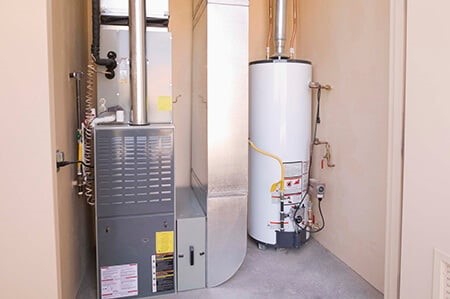
The Basics: What to Know About Your Furnace The Basics: What to Know About Your Furnace Air Temperature Control, Inc Call Now : 734-697-8288 Air Temperature Control, Inc Any Michigan homeowner knows that you want your heating system to work properly. In the winter months, it can become a complete emergency if we have to go without heat due to a problem or breakdown with our furnace. Understanding your furnace is crucial. If you’ve been putting off learning about it, or if you’re curious about its inner workings, now is the time to delve into it. Here, we’ll guide you through the essential aspects of your furnace. How Your Heating System Works: Efficiency and Comfort in Your Home Although every unique furnace model will vary, your HVAC system typically consists of four components: the indoor part of the system, such as the furnace or air handler; the outdoor unit, such as the air conditioner or heat pump; the thermostat; and the air quality component, such as humidity control or air filtration. Other factors to be aware of include: Heating capacity: Depending on your home’s unique needs, this refers to the overall capacity of your furnace. Ventilation: how your air is passed through the home and ventilated is Exhaust: If it were to build up without ever being cleaned, exhaust, a byproduct of your furnace, can pose a risk to your health and safety. Electrical: Not to be forgotten, but it is the key that your electrical system plays in keeping things running. Is it Time for a New Furnace? Furnaces typically last 20-30 years. If you are over 15 years old, it’s wise to start thinking about a replacement. Here’s how to know if it’s time for a new one: Signs You Need Furnace Replacement: Age: Over 15 years old. Frequent Repairs: Constant breakdowns are a red flag. High Energy Bills: Increasing costs with consistent usage. Uneven Heating: Some rooms are too hot or too cold. Short Cycling: The furnace turns on and off frequently. Humidity Problems: The air feels too dry or too humid. Strange Noises: Rattles, buzzes, hums, or excessive noise. Dust and Debris: The furnace blows out dust, soot, or rust. Visible Rust or Damage: Corrosion, cracks, or rust on the unit. What to Do: Call an HVAC Professional: If you notice any of these signs, have your furnace inspected. A simple repair or filter change might be enough. Check the AFUE Rating: A technician will assess your furnace’s efficiency using the Annual Fuel Utilization Efficiency (AFUE) rating. This rating measures the amount of fuel converted to heat in a year, with higher ratings indicating more efficient furnaces. An AFUE below 80% means it’s time for a replacement. Consider a Home Warranty: If your furnace is nearing the end of its life, a home warranty might help cover repair or replacement costs. Home warranties can provide peace of mind and financial protection against unexpected repair or replacement costs. Be sure to check the policy for coverage limitations on older systems. Get Contractor Estimates: Obtain estimates from at least three reputable HVAC contractors. When getting estimates, make sure they include details about the new furnace, removal of the old unit, permits, and any necessary modifications to your home’s systems. This will help you compare the total cost and scope of work involved in the replacement. Energy Efficiency: Upgrading to a new, energy-efficient furnace is a smart financial move. Energy Star-qualified furnaces are significantly more efficient than older models, potentially saving you $94 per year for gas and $66 per year for oil. This means you can enjoy a comfortable home while being mindful of your budget. Key Takeaway: Air Temperature Control, Inc Don’t wait for your furnace to fail. Taking a proactive approach to replacement can put you in the driver’s seat, saving you money, improving comfort, and increasing your home’s energy efficiency. A single-stage furnace is one with one speed—meaning you have full heat (maximum speed) that provides warm air. Put your system will “wait” for the air to cool down, which triggers your furnace to turn on again. This is how conventional furnaces work to heat your home in the winter. You can see how this “off or on” furnace setup is not as efficient as furnaces that have adjustable and adaptable furnace capacity. Two-stage furnaces offer greater control and consistency in heating your home, unlike the ‘on or off’ setup. Their precision allows you to regulate the heat output of your furnace continuously, even as the outdoor temperature fluctuates throughout the day. With a variable-speed furnace, the fan moves at various speeds to control the amount of heat dispersed throughout your home. Increased airflow means a more comfortable home, including improved air quality. In the end, single-stage furnaces inevitably result in constant temperature variation. Homes with two-stage or variable-speed furnaces are more adaptable in real-time and, in most cases, allow you to keep a more constant temperature in the house. We’ve been in business since 2001 and have a great reputation. We are proud members of the Better Business Bureau with an A+ rating. What Else Should I Know About My Furnace? As much as we try to keep things simple here, it is true that your heating system is a complex, complicated system—but also one of the most important parts of any home! Here is what else we can help you understand better: Humidity in your home: A humidifier and dehumidifier can help control your humidity level. Some systems are built into your system, but we can also help if you want to add a separate dehumidification or humidity system to your current setup. The benefit of flexible solutions: conventional heat pumps would force heated air through ducts. Compare this to ductless systems, which work to deliver air directly into various zones of the home. Ductless systems, which deliver heat on a room-by-room basis, are gaining popularity. This is what people mean when they talk about zone-based heating. Many homeowners opt for this system for its cost-saving benefits in both heating and cooling.
Seasonal HVAC Maintenance: A Guide to Year-Round Comfort
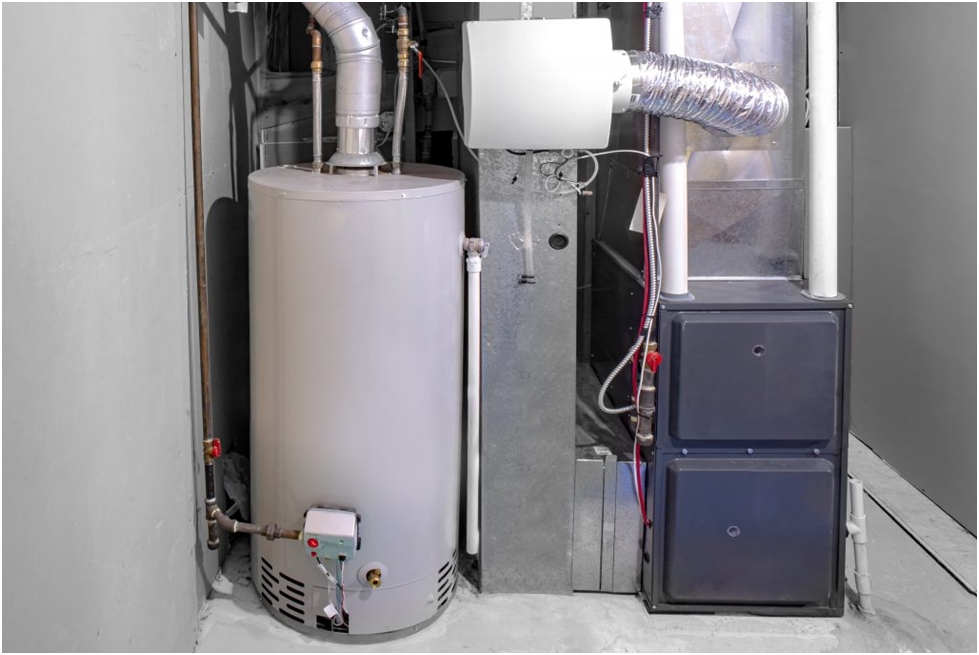
Seasonal HVAC Maintenance: A Guide to Year-Round Comfort Expert HVAC Services in Ypsilanti, MI | Heating & Cooling Maintaining your HVAC system is crucial for year-round comfort and to prevent costly breakdowns. Here’s a seasonal guide to keep your system running smoothly: Book AC & heating services in Ypsilanti, MI with the area’s leading team at Air Temperature Control If you need heating, air conditioning, or air quality services in Ypsilanti, MI? Call today for a free estimate. Satisfaction guaranteed! Call Now 734) 697-8288 Spring: Schedule a comprehensive AC inspection: Checking electrical components, refrigerant levels, thermostat calibration, lubricating the motor, cleaning the evaporator and condenser, and replacing air filters. Why Spring? It’s the perfect time to beat the summer rush and avoid higher prices and longer wait times for AC repairs. By scheduling your maintenance in advance, you’re taking a proactive step to ensure your comfort and peace of mind. Summer: Monitor AC performance: Watch your system if you’ve had a spring tune-up. Prevent AC freeze-up: Turn off your AC for a few hours periodically, especially after extended use during heat waves. Change filters: Replace filters as needed and keep the unit debris-free. Autumn: Focus on your furnace: Schedule a professional inspection for your furnace, boiler, and heating system. Key tasks: Ensure the furnace starts appropriately, clean it thoroughly (inside and out), clean burners, check for leaks, clear vent lines, change the air filter, and inspect pipes, radiators, ducts, and heating vents. Winter: To maintain furnace efficiency, Insulate pipes to prevent freezing, regularly check the vent lines and pilot light, and program your thermostat to avoid overuse. Benefits of Seasonal HVAC Maintenance: Prevents costly repairs: Regular maintenance identifies and addresses minor issues before they become significant problems, giving you peace of mind and saving you from unexpected expenses. Ensures year-round comfort: A well-maintained system provides consistent heating and cooling. Extends the life of your HVAC system: Proper care helps your system last longer and operate more efficiently. Improves indoor air quality: Clean filters and a well-maintained system contribute to healthier indoor air. Choosing the Right Furnace: A Simplified Guide Fixing Common Furnace Problems Guide for Homeowners Investing in a new furnace is a big decision. To ensure you’re getting the perfect fit for your home and budget, consider these key factors: Size Matters: A furnace that’s too small won’t keep your space warm enough and will wear out quickly. A furnace that’s too large will be expensive and inefficient. Factors like square footage, number of levels, and insulation affect sizing. A professional assessment is crucial. Efficiency is Key: Higher efficiency furnaces cost more upfront but save you money on energy bills in the long run. Look for the furnace’s efficiency rating to understand its long-term cost benefits. Quality and Warranty: Choose a reputable brand and a reliable HVAC installer. A good warranty protects your investment by covering the equipment and the installation. Price and Transparency: Get quotes from multiple local contractors. Ensure the price includes all costs – equipment, installation, and potential fees – to avoid surprises later. Making it Easy: Choosing a furnace can feel overwhelming. With Air Temperature Control, you can simplify the process. We’ll handle everything: Expert Assessment: We’ll determine your home’s ideal HVAC system and size. Top Brands: We offer a selection of reliable and efficient furnace brands. Accurate Estimates: We’ll provide transparent pricing with no hidden costs. Guaranteed Satisfaction: Your comfort is our priority. Contact Air Temperature Control for a free estimate and let us take the hassle out of finding the perfect furnace for you. Our Services Our Products Comfort Shouldn’t Cost a Fortune! Get fast, affordable service with a FLAT FEE GUARANTEE* Request a FREE ESTIMATE * Indicates required questions
Why Air Temperature Control is your preferred HVAC Contractor
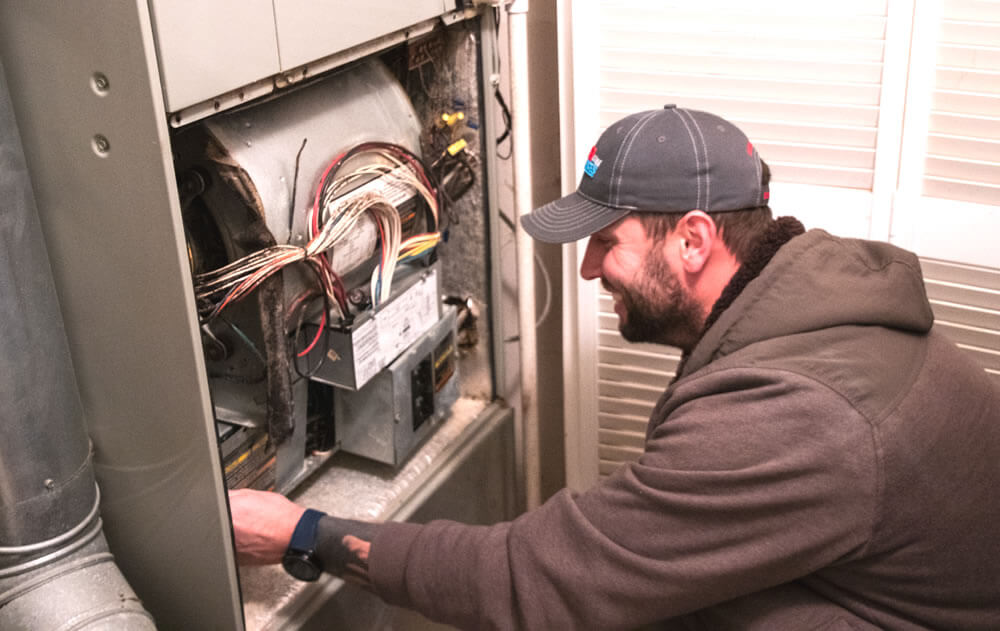
Why Air Temperature Control is your preferred HVAC Contractor Heating Tune-Ups & Furnace Repair In Ypsilanti, MI For more than 30 years, Air Temperature Control——has proudly served Southeast Michigan, including Wayne, Oakland, and Macomb counties. As a trusted HVAC contractor, we offer a comprehensive range of heating and cooling services, from basic air conditioning recharges to complete installations of furnaces, boilers, or air conditioning systems. Heating Tune-Ups & Furnace Repair Ypsilanti, MI: Air Temperature Control Heating & Air Conditioning. (734) 697-8288 Why Choose Air Temperature Control as Your Go-To HVAC Contractor We stock only the best heating and cooling equipment from top manufacturers such as Thermo-Pride, Ruud, Carrier, Lennox, American Standard, and Trane. This extensive selection allows our experienced technicians to identify the most efficient and effective heating and cooling solutions tailored to your needs. Our goal is to ensure a comfortable environment for your family throughout the hot, humid summers and long, cold Michigan winters while also helping to reduce your energy costs. Our fully-equipped sheet metal shop can handle any custom heating, cooling, and ventilation projects you may require. Do you experience high energy costs, yet your home never feels like it’s at the right temperature? Or you’ve had an unexpected system failure. We provide air conditioner and furnace repairs at a budget-friendly flat rate, ensuring you don’t have to break the bank for comfort. We also offer complete system replacements and new installations. As an authorized Comfort maker dealer, we offer competitive pricing on top-rated high-efficiency equipment that will reduce your energy expenses. Our new system installations also include a 10-year parts warranty, ensuring your comfort is protected for years to come. Our trucks are a common sight on the roads of Southeast Michigan, as we service a wide range of cities, including Van Buren Township, Romulus MI, Ypsilanti MI, Canton MI, Ann Arbor MI, New Boston MI, Saline MI, Wayne MI, Troy, Center Line, Warren, Detroit, Birmingham, Royal Oak, Bloomfield Hills, and Novi. However, our services are not limited to these locations. Contact us today, and we are confident that we can assist with your HVAC contractor needs, no matter where you are in the region. Our widespread service area ensures that we are always within reach, providing you with the convenience and peace of mind you deserve. Dependable Heating and Cooling Solutions in Belleville, MI Air Temperature Control Heating & Air Conditioning Throughout Southeast Michigan, we have earned the trust of homeowners, business owners, and contractors. Our success is built on a simple principle: treating each customer as part of our family and offering only the products and services we would choose for ourselves. We value each of our customers and strive to provide the best service possible. Our passion lies in providing tailored services to each client. Our goal is not to upsell unnecessary products or services but to attentively listen to your heating and cooling needs and offer the most suitable solutions. Ready to experience our customer-centric approach? Click the button below to discover more. Request a FREE ESTIMATE * Indicates required questions
Fixing Common Furnace Problems Guide for Homeowners
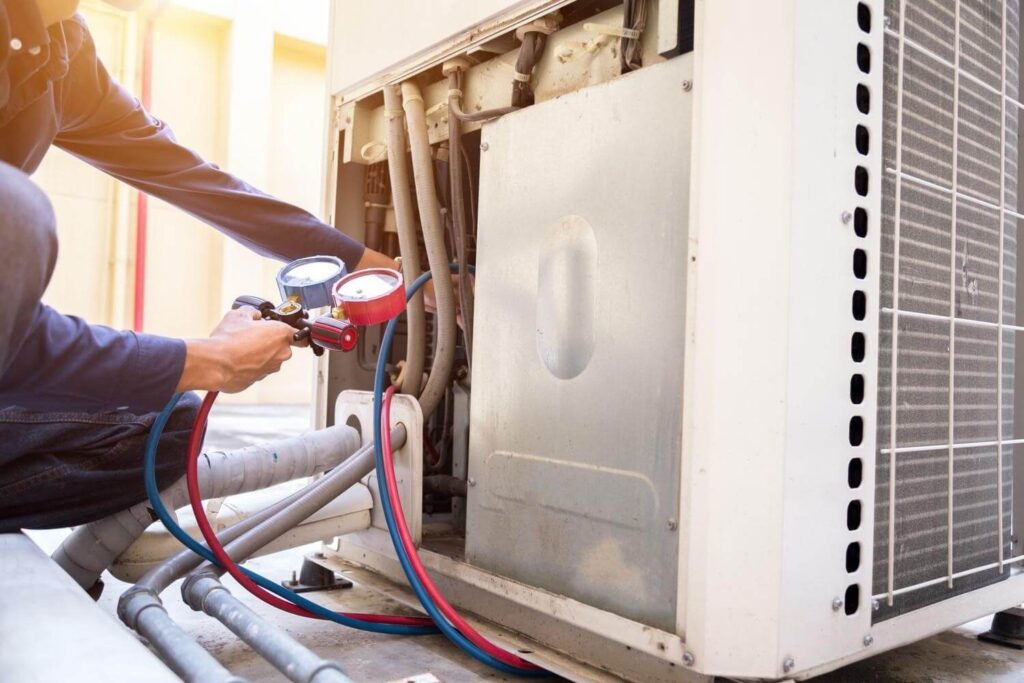
Fixing Common Furnace Problems- A Guide for Homeowners Air Temperature Control, Inc Common furnace problems can be a source of frustration for homeowners, especially during the colder months. However, understanding these issues and their solutions can bring a sense of empowerment and control. Furnaces are an essential part of most homes, and when they break down, they can cause discomfort and inconvenience. Fortunately, many common furnace problems can be easily fixed with some basic troubleshooting and maintenance. Furnace-Installation-Saline-MI Furnace-Installation-Ypsilanti-MI One of the most common furnace problems is a dirty filter. A dirty filter can cause the furnace to work harder than it needs to, leading to increased energy bills and decreased efficiency. Another common issue is a malfunctioning thermostat, which can cause the furnace to turn on and off at the wrong times or not turn on at all. Common furnace problems include failing blower motors, ignitors, and condensate pumps. We’ve been in business since 2001 and have a great reputation. We are proud members of the Better Business Bureau with an A+ rating. Understanding Your Furnace Understanding Your Furnace: Furnace-Installation-Canton-MI a furnace is a crucial component of a home’s heating system. Homeowners who understand how it works can identify and fix problems, ensuring their comfort and safety. Most furnaces use natural gas or propane to heat the air, which is then circulated throughout the home via ductwork. Electric furnaces, though rare, are also available. The main components of a furnace include the burners, heat exchanger, blower, and thermostat. The burners ignite the fuel and heat the heat exchanger, heating the air. The blower then circulates the heated air through the ductwork and into the home. The thermostat controls the temperature by turning the furnace on and off. It’s crucial to note that furnaces require regular maintenance to function properly. Neglecting maintenance can lead to various problems, including reduced efficiency, increased energy bills, and even safety hazards. By staying on top of regular maintenance, homeowners can take a proactive role in ensuring their furnace’s proper functioning and safety. Be Aware of Your Furnace’s Age: homeowners should also be aware of their furnace’s age. Most furnaces last between 15 and 20 years, and older furnaces are more prone to breakdowns and other issues. If a furnace is approaching the end of its lifespan, it may be more cost-effective to replace it rather than continue to repair it. Furnace-Installation-Milan-MI In summary, understanding a furnace’s essential components and operation is key to identifying and fixing problems. This knowledge empowers homeowners, making them feel informed and knowledgeable. Regular maintenance and awareness of the furnace’s age are also important to ensure proper functioning and safety. Common Furnace Problems Furnaces are essential to many homes, providing warmth and comfort during the colder months. However, like any other appliance, furnaces can experience problems from time to time. Here are some of the most common furnace problems homeowners face and how to fix them: Furnace won’t turn on: If the furnace isn’t running, the first thing to check is whether the thermostat is on. If it won’t turn on, replace the batteries. If the thermostat is on and functioning normally, check if the furnace is plugged in with the access panel fully closed. If so, check to see if the furnace circuit breaker has tripped. Frequent cycling: If the furnace turns on and off frequently, it could be due to a clogged filter, a malfunctioning thermostat, or a blower motor problem. Replace the filter and check the thermostat settings. If the problem persists, it’s best to call a professional. The furnace doesn’t heat: If the furnace is running but not producing heat, it could be due to a dirty flame sensor, a malfunctioning ignitor, or a faulty limit switch. Clean the flame sensor and check the ignitor. If the problem persists, it’s best to call a professional. Malfunctioning thermostat: If it isn’t working correctly, it could be due to dead batteries, a loose wire, or a faulty thermostat. Replace the batteries and check the wiring. If the problem persists, it’s best to call a professional. The blower continuously runs: If the blower motor runs constantly, it could be due to a malfunctioning limit switch, a faulty thermostat, or a wiring problem. Check the limit switch and thermostat settings. If the problem persists, it’s best to call a professional. Failed condensate pump: If the furnace has a condensate pump, it could fail due to a clogged drain line, a faulty float switch, or a malfunctioning pump motor. Clean the drain line and check the float switch. If the problem persists, it’s best to call a professional. Failed blower motor: If the blower motor fails, it could be due to a faulty motor, a bad capacitor, or a wiring problem. Check the motor and capacitor. If the problem persists, it’s best to call a professional. Failed ignitor: If the ignitor fails, it could be due to a dirty ignitor, a faulty control board, or a wiring problem. Clean the ignitor and check the control board. If the problem persists, it’s best to call a professional. Cracked heat exchanger: A cracked heat exchanger is a serious problem that could lead to carbon monoxide leaks. If you suspect a cracked heat exchanger, call a professional immediately. Noisy furnace: If the furnace is making unusual noises, it could be due to a loose belt, a dirty burner, or a failing blower motor. Tighten the belt and clean the burner. If the problem persists, it’s best to call a professional. By being aware of these common furnace problems and knowing how to fix them, homeowners can keep their furnaces running smoothly and efficiently. However, it’s important to remember that some issues are best left to the professionals, especially those involving gas lines or electrical components. Troubleshooting Furnace Issues When a furnace stops working, it can be a frustrating experience, especially during the winter months. However, homeowners can perform some troubleshooting steps before calling a professional to identify and fix the issue. Here are some common furnace problems and their solutions: No Heat or Insufficient
